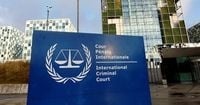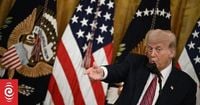On August 20, 2025, the United States dramatically escalated its standoff with the International Criminal Court (ICC), announcing fresh sanctions against four of the tribunal’s senior officials. The move—directed at judges Nicolas Yann Guillou of France and Kimberly Prost of Canada, as well as deputy prosecutors Nazhat Shameem Khan of Fiji and Mame Mandiaye Niang of Senegal—has ignited a storm of international criticism and raised fundamental questions about the future of global justice.
According to Reuters, the sanctions are the second round imposed by the Trump administration in less than three months, targeting ICC figures involved in investigations linked to the United States and Israel. The U.S. government’s actions freeze any American assets the designated individuals may hold and sever their access to the U.S. financial system. For the ICC, already under pressure from powerful states that refuse to recognize its authority, the latest measures threaten to impede its ability to prosecute some of the world’s most serious crimes.
U.S. Secretary of State Marco Rubio did not mince words in his statement, calling the ICC “a national security threat that has been an instrument for lawfare against the United States and Israel.” He added, “United States has been clear and steadfast in our opposition to the ICC’s politicization, abuse of power, disregard for our national sovereignty, and illegitimate judicial overreach.” Rubio’s remarks reflect a longstanding hostility from Washington toward the court, especially when its investigations have touched on American or Israeli officials.
The ICC, for its part, issued a sharp rebuke. In a statement quoted by Ripples Nigeria, the court condemned the sanctions as “a flagrant attack against the independence of an impartial judicial institution.” The ICC further declared that these measures “constitute an affront against the Court’s States Parties, the rules-based international order, and, above all, millions of innocent victims across the world.” The court called on its member states and all who value “humanity and the rule of law” to provide “firm and consistent support.”
The United Nations and France quickly joined the chorus of criticism. U.N. spokesperson Stéphane Dujarric told reporters in New York, “The decision imposes severe impediments on the functioning of the Office of the Prosecutor and respect for all situations currently before the Court.” He emphasized, “Judicial independence is a fundamental principle that must be respected, and these types of measures undermine the foundation of international justice.” France’s Foreign Ministry also weighed in, calling the judges’ work “essential in the fight against impunity” and urging Washington to withdraw the sanctions.
The row comes at a time when the ICC is handling some of its most high-profile and politically sensitive cases. In November 2024, ICC judges issued arrest warrants for Israeli Prime Minister Benjamin Netanyahu, former Israeli defense chief Yoav Gallant, and Hamas leader Ibrahim al-Masri, alleging war crimes and crimes against humanity during the Gaza conflict. The court is also pursuing investigations into alleged war crimes in Ukraine, Sudan, Myanmar, the Philippines, and Venezuela. According to Reuters, the sanctions are expected to impede the ICC’s functioning as it pursues these complex and contentious cases.
The targeted officials have played key roles in the court’s most controversial proceedings. Judge Nicolas Yann Guillou presided over the pre-trial panel that issued the arrest warrant for Netanyahu. Deputy prosecutors Khan and Niang have been involved in cases touching on both Israel and the United States. Judge Kimberly Prost, meanwhile, sat on the appeals chamber that in March 2020 unanimously authorized the ICC prosecutor to investigate alleged war crimes and crimes against humanity committed in Afghanistan since 2003—including examining the role of U.S. service members. That investigation, which sparked the Trump administration’s initial round of sanctions against the ICC in 2020, has since shifted focus to alleged crimes by the Afghan government and Taliban.
For the United States and a handful of other countries—including China, Russia, and Israel—the ICC has long been a source of suspicion, if not outright hostility. None of these nations are party to the Rome Statute, the 1998 treaty that established the court and took effect in 2002. As Reuters notes, the ICC’s jurisdiction covers genocide, crimes against humanity, and war crimes within its 125 member states, or when a situation is referred by the U.N. Security Council. But the absence of major powers from its membership has always been a major limitation, both practical and symbolic.
Netanyahu’s office, unsurprisingly, welcomed the U.S. sanctions. The Israeli government has repeatedly denounced the ICC’s investigations as politically motivated. In a statement after the latest designations, Netanyahu’s office praised the Trump administration’s “steadfast opposition to the ICC’s illegitimate judicial overreach.”
Yet for many in the international community, the U.S. move represents a dangerous attack on the very idea of international justice. The United Nations, France, and the ICC itself have all argued that the court’s independence is vital to combating impunity for the world’s worst crimes. As the French Foreign Ministry put it, “Their role is essential in the fight against impunity.” The ICC, in its own words, investigates “the gravest crimes of concern to the international community: genocide, war crimes, crimes against humanity, and the crime of aggression.”
The Trump administration’s antipathy toward the ICC is nothing new. In 2020, Washington imposed sanctions on then-prosecutor Fatou Bensouda and one of her top aides over the court’s work on Afghanistan. The new measures, however, represent a significant escalation, coming as the court is more active than ever in cases that touch on powerful states and their allies. According to Reuters, the escalation will likely impede the functioning of the court and the prosecutor’s office, especially as they deal with war crime allegations against Russia over its invasion of Ukraine.
Supporters of the U.S. approach argue that the ICC has overstepped its bounds and become a tool for political attacks on countries that never consented to its authority. They point to the court’s pursuit of cases involving American and Israeli officials as evidence of bias and judicial overreach. As Rubio said, “I urge countries that still support the ICC, many of whose freedom was purchased at the price of great American sacrifices, to resist the claims of this bankrupt institution.”
On the other hand, defenders of the ICC warn that undermining the court’s independence risks eroding the global fight against impunity. The United Nations and France, among others, have called for respect for judicial independence and for continued support for the court’s mission. The ICC itself has appealed to its member states and the broader international community to stand in solidarity and uphold the values of humanity and the rule of law.
As the dust settles, the world is left to grapple with a profound question: can international justice survive when the most powerful nations refuse to play by its rules? The answer, for now, remains uncertain—but the stakes could hardly be higher.


